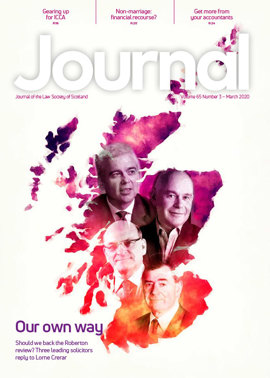ILC welcomes new faces

Brief introductions please! Tell us about your career path to date, and how have you got to where you are now?
Michael Byrne (MB), corporate counsel, Thermo Fisher Scientific: I trained with a large Scottish firm. On qualification in 2014, I worked for a spell in corporate recovery/restructuring, before moving to a broader commercial dispute resolution role. I moved in-house in 2018 and to my current role in 2020.
Rachael McLean (RM), head of Legal Modernisation Unit, Scottish Government Legal Directorate: After starting my career in commercial litigation at McGrigors, I moved in-house in 2008. I started out as a legal adviser at the Scottish Parliament and have worked in a variety of roles for the Scottish Government Legal Directorate (SGLD). I currently head our Legal Modernisation Unit, leading an ambitious programme to drive forward business-critical improvement and modernisation work.
John Morrison (JM), legal counsel, Phoenix Group: I joined the Standard Life graduate scheme in 2012, along with two other trainees and a number of graduates from other disciplines. I’m now a legal counsel for the Phoenix group.
Catherine Corr (CC), principal solicitor, Scottish Enterprise: I spent my traineeship at Shepherd & Wedderburn, followed by eight years in its Corporate division, including two short periods of secondment to clients in the financial services and drinks sectors. I moved in-house to the legal team at Scottish Enterprise in mid-2013, supporting SE colleagues on a wide range of activities nationally and internationally.
You all work for very different organisations, doing very different roles. What common themes bring such a diverse group together?
MB: A passion for ensuring that the views of the in-house profession are represented and that their needs are met. Everyone on the In-house Lawyers’ Committee (ILC) works together to ensure that in-house solicitors have as much support as possible. This includes ensuring that a great schedule of CPD is available, including the excellent annual in-house lawyers’ conference which is held in June.
RM: The sheer range of subject matters that in-house lawyers advise on is a common theme and challenge we all face. We have unique relationships with our clients and there is a common need to be clear about the respective roles of legal adviser and client, whilst working together flexibly to understand and service the business we are operating in.
JM: I believe we all enjoy the feeling that we are an integral part of our respective organisations, the feeling of being close to the decision-making and of being a voice of conscience. Day by day, we’re each having an impact on our clients’ successes, whether that’s in the commercial sense, or in good public service. But despite working for very different organisations, what brings us together is our foremost commitment to the law and the legal profession.
CC: It’s the need to be able to provide the “full circle” of legal advice. It’s not just about knowing what the law says and providing a view. Rather, it’s about both understanding the rules and identifying appropriate next steps in light of those rules. Also, having a keen awareness of the importance of reputation and comms and working closely with your colleagues on this front is, I think, imperative. You are part of a living, breathing organisation where advice frequently has real time consequences.
2020 brings a new decade. What do you see as the biggest challenges ahead for in-house lawyers (or in your sector)?
MB: The 2010s have certainly been a decade for the history books, and early indications suggest that the 2020s will shape up in a similar fashion. A hangover from the last decade, and I think the biggest challenge for us all, is Brexit. The volatility of the political landscape both within the UK and globally doesn’t help. The old curse, “May you live in interesting times,” certainly seems apt!
RM: I think that all in-house lawyers continue to face the challenge of providing their clients excellent legal services within particular financial constraints and against the backdrop of a complex external landscape. Over the past few years we have needed to be flexible and responsive to meet the changing demand for legal services, and that looks set to continue.
JM: In the financial services sector, who can say who will be the main players in the field by the time 2030 comes around, or what products and services they’ll be offering? The one thing that seems certain is that we’ll be dealing with constant change. For in-house lawyers across the board, we’ll have to work to keep up with the competition and prove our value to clients. I predict we’re also going to witness the rise of the first robo-lawyers. We’re going to have to learn and re-learn to adapt. It’s definitely going to be exciting.
CC: A key issue for all of us to address will obviously be the impact of Brexit and how that plays through into the legal environment in Scotland, both in the public and private sector. There are also certain challenges for an in-house team that may be considered perennial. Key amongst these is the constant need for intelligent prioritisation amongst different demands on your time, and being able to adapt to the changing needs of your employer at any particular time.
Why did you join the ILC? What do you hope to bring to the role of committee member and what do you hope to get out of it?
MB: My main motivation was to give something back to the Scottish legal community which has nurtured my career to date. I’m also very eager to promote the interests of in-house solicitors and increase awareness of in-house as a career path, particularly among students and trainees.
RM: As one of the biggest employers of solicitors in Scotland, SGLD is a significant part of the in-house legal community and we can bring a different perspective and experience to the committee’s work. I look forward to sharing best practice with others in different areas of this community and learning from their experience. I am keen to raise the profile of the interesting, challenging and valuable work that Government lawyers do.
JM: It’s a great honour to be on a Law Society of Scotland committee. I’m enthusiastic to promote the contribution of in-house lawyers to the profession at large, and in particular the benefits of in-house traineeships.
CC: The ILC aims to recognise and support the role of an in-house lawyer. It also provides a forum through which to share best practice and consider new trends and/or innovations within the marketplace. Having the opportunity to contribute to that work greatly appealed. On a personal level, I am looking forward to learning new skills from others with whom I come into contact and to gaining new insights into the diversity of the in-house profession.
What advice would you give anyone looking to start a career in your sector or in-house more generally?
MB: Identifying the right in-house role to move to from private practice can be challenging – every organisation looking to employ an in-house solicitor has its own requirements. It’s important to build up a broad portfolio of experience. Specialising in an area can have its advantages, but being too niche could cause you to miss out on opportunities. Try to develop a deep commercial understanding of why clients do what they do and why they need you. Don’t be afraid to ask obvious questions for fear of looking stupid – sometimes answers to the obvious questions hold the keys to unlocking the problem but no one is willing to ask them.
RM: Go for it! The work is hugely interesting and challenging and provides a range of work and experience that is difficult to find anywhere else. At the Scottish Government, you will also get to work with some very talented lawyers and colleagues. Ours is a unique role which gives people a chance to make a real difference.
JM: Practising law in-house is a worthy and satisfying career. You might be suited to an in-house role if you’re interested in business or public administration, if you enjoy close relationships with colleagues, if you’ve got good judgment and if you’re creative, well rounded and industrious. If you’re contemplating an in-house move, my main advice is – get in touch with the ILC! We’d love to hear from you.
CC: It’s important to be interested and engaged with whatever business you join, to believe in its overall direction. From my perspective, I think the sort of role I do is a unique one in Scotland, something which is particularly motivating. The chance in some way to contribute to the overall wellbeing of the Scottish economy is a privilege, and the breadth of projects that cross my desk keeps things interesting.
[Pictured above l-r: Michael Byrne, Rachael McLean, John Morrison and Catherine Corr]
The In-house Lawyers’ Committee aims to represent, support and promote the interests and status of solicitors working in-house in Scotland and beyond. If you’re interested in getting involved, look out for committee vacancies coming up this spring. For more information, please contact Beth Anderson, head of engagement for in-house lawyers at the Law Society of Scotland (bethanderson@lawscot.org.uk)






